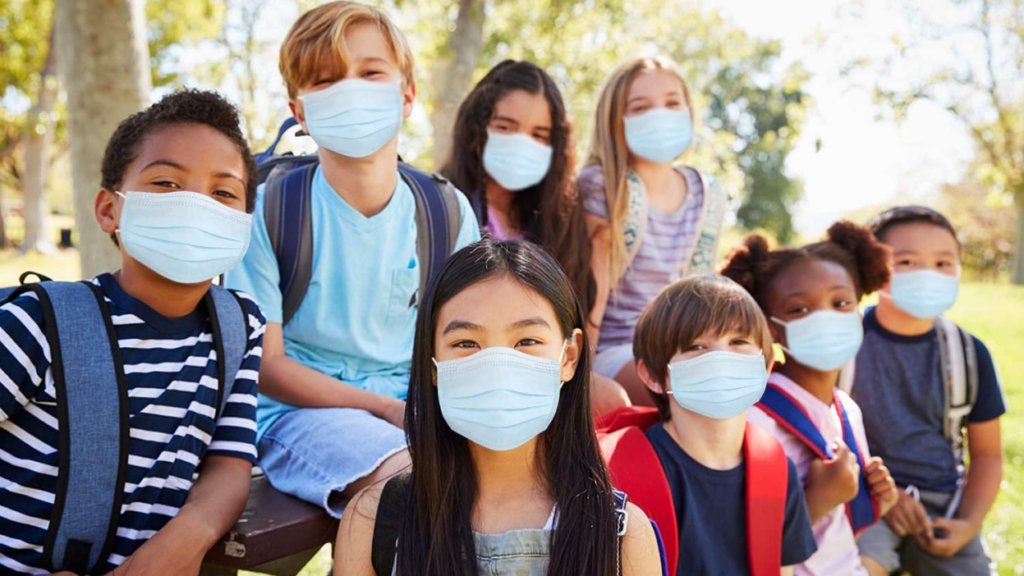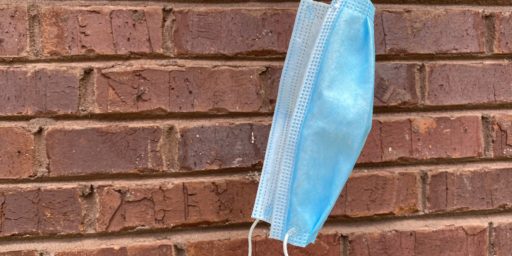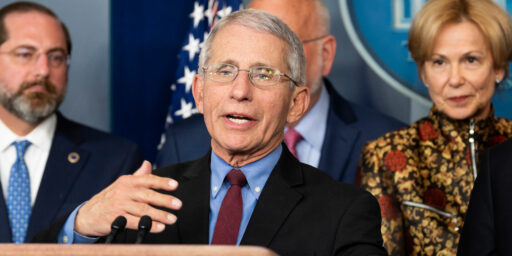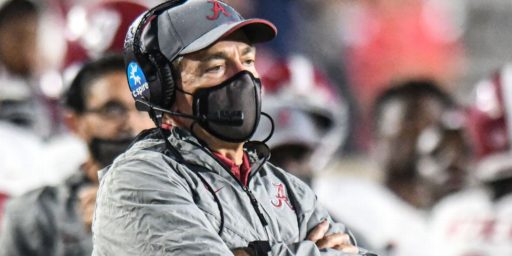Forced Masking to Protect the Most Vulnerable
Parents of disabled kids have successfully sued to mandate masks in schools.

NYT (“A Virginia judge rules that 12 families can enforce mask mandates in classrooms for their vulnerable children, despite state law“):
A federal judge on Wednesday ruled in favor of 12 Virginia families who argued that policies making masks optional in classrooms violated the rights of their children, who have health conditions that make them vulnerable to the virus. The case is only the latest example of the legislative back and forth that is accompanying the adjustment to new, post-pandemic norms.
The families filed suit against Gov. Glenn Youngkin, a Republican, and other state officials last month after the governor signed a bill that effectively bars mask mandates in schools.
[…]
On Wednesday, U.S. District Judge Norman K. Moon granted a preliminary injunction to allow the 12 families in the lawsuit to request mask requirements at their children’s schools if recommended by a doctor as a “reasonable modification” while their case proceeds. In effect, the decision challenges the interference of state law with federal disability rights law when a child requires community masking in order to participate in a classroom setting.
The students have health conditions — which include cystic fibrosis, asthma, Down syndrome, lung conditions and weakened immune systems — that make them particularly vulnerable to coronavirus infections, their parents outlined in the complaint.
The judge made clear that families of other vulnerable children will have to pursue their own suits, as the executive order and the state law remain in effect.
“This is not a class action, and the twelve plaintiffs in this case have no legal right to ask the court to deviate from that state law in any schools in Virginia (much less school districts) their children do not attend, or indeed even those areas of their schools in which Plaintiffs’ children do not frequent,” Mr. Moon wrote in the decision.
Eden Heilman, legal director for the A.C.L.U. of Virginia, said that while the injunction is limited to these 12 students, it is “clearly a blueprint” for any parent of a student with a disability who may need classroom masking as an accommodation under the Americans with Disabilities or Rehabilitation acts — which make clear that children with disabilities should not be segregated or denied access to the same education as their non-disabled peers.
I honestly don’t know what to make of this.
The legal wrangling here is beyond my limited expertise. The state legislature passed and the governor signed a law that I have no reason to believe violates either the US or Virginia constitution. So, it should be presumed binding. And, indeed, the judge seems to think that; he’s simply granting an injunction for 12 students.
But what I actually wrestle with is the equity issue. We have twelve kids with various serious medical conditions. How much power should they (or, in this case, their parents) have to impose requirements on other people to ensure their safety? The hell if I know.
The ADA’s “reasonable accommodations” typically don’t impose negative externalities on ordinary citizens. If a student is dyslexic, as my youngest is, school officials are required to provide extra services, allow additional time to complete certain tasks, and the like. But other students aren’t expected to make sacrifices.
We know that masking is not cost-free. My 13-year-old was very happy to get hers off. But, as with me and finally getting rid of them at the office, it was mostly a matter of normalcy, not the lifting of a massive burden. My 10-year-old, though, is hard of hearing and the masks genuinely made school more of a struggle for her, as she was unable to pick up physical cues from facial expressions that help her make sense of what she’s hearing.
The closest analogy to this that comes to mind is the proliferation of policies in recent years to protect those with peanut allergies. Some workplaces and schools either ban the bringing of peanut products or otherwise provide some protections for employees or students with said condition. My kids’ schools have typically banned peanut-based snacks in the classroom—especially if any of the other kids were known to have a peanut allergy—and had segregated “nut-free tables” in the lunchroom. That’s inconvenient for the vast majority of students who don’t have allergies—and, especially, for parents of picky young eaters for whom a PB&J sandwich was the easy button—but pretty minor in the grand scheme of things.
Where the line should be drawn, though, I haven’t the foggiest. The students at the center of the lawsuit have no way to impose masking requirements on the general population, so this injunction only protects them while at school. And, when they turn 18, they’ll be unprotected everywhere. Unless they’re able to get similar orders that follow them wherever they go. Which seems quite unreasonable.






I think you might be surprised at how often this is not the case, at least in a classroom environment. I have a relative that spent 40 years working with Special Ed students in a public high school setting. Most accommodations were such as you described, but there were also a continuous stream of students whose parents fought tirelessly and angrily for their students to remain in the mainstream classrooms but whose disabilities resulted in constant disruptions. These ranged from the mild, such as kids bringing in whole collections of fidget spinners and fiddling with them constantly (it helps them concentrate) to sometimes frightening interactions with kids whose disabilities involved emotional and behavioral outbursts, completely disrupting the classroom. These were high school kids, so some of them were physically large and intimidating. And to remove such a kid from the classroom if their parent opposes it is a long, long tedious process of action plans, mandatory teacher/principle/parent meetings, re-evaluations of both the student and teacher, documentation, etc etc etc, and even with months worth of work the odds the school will get sued is distressingly high.
@MarkedMan: Yes, that’s fair. “Mainstreaming” these kids doesn’t require the rest of the students to actually do anything but it doubtless comes at a cost to their education.
@James Joyner: Whenever someone starts dissing the public schools and comparing their expenses and outcomes negatively to charter schools or private schools, I always point out that the private schools make sure that the most difficult and expensive students end up in the public schools.
Strangely, my daughter with hearing aides has loved the masks in the classroom because it deadens the other students, and she hasn’t had a problem hearing the teacher. Cafeteria is another story.
Here’s my problem with this whole post: The idea that masking up is some kind of “sacrifice.” No, it’s not. It’s an inconvenience, something one does to protect other people, in this case children at severe risk if infected with the corona virus.
35 years of construction has left me as deaf as a post. Like your daughter masking makes it difficult for me to “pick up physical cues from facial expressions” that help me make sense of what I’m hearing. In fact, there are a whole host of things going on in my brain to help me fill in the blanks of a conversation that are made more difficult to do by masking. But I’ve made adjustments.
One of which is asking, “I’m sorry, can you repeat that?”
James: “How much power should they (or, in this case, their parents) have to impose requirements on other people to ensure their safety?”
I totally reject the phrasing of your sentence, James. Let’s rephrase: “Why did the parents of 12 vulnerable kids need to use the courts for protection that the adults in the school system should have been glad to assume on their own to protect the kids in the first place?”
When did a minor inconvenience become some kind of insupportable tyranny?
Nobody likes wearing masks; nobody likes inconveniences. But maybe, just maybe, other things are more important than not being inconvenienced? Maybe being considerate, going above and beyond the daily requirements for sharing our space with other people, means sucking it up occasionally?
JJ: “We know that masking is not cost-free. My 13-year-old was very happy to get hers off.”
Wow, that’s some convincing argument. Apparently the cost of masking is so huge that a teenager was happy to take hers off.
@Not the IT Dept.: “But maybe, just maybe, other things are more important than not being inconvenienced? Maybe being considerate, going above and beyond the daily requirements for sharing our space with other people, means sucking it up occasionally?”
Socialism!!!!!!!!!!!!!
@wr: Oh, FFS. Don’t cherry pick a single sentence when the next sentences make the point very clear.
@OzarkHillbilly:
Agreed.
Lying inside a closed box under six feet of dirt seems like a greater sacrifice to make.
@James Joyner:
Assuming that was directed at me, rather than WR, this would be my response: the presence of that sentence in your post rather calls into question how seriously you meant or I should take “the next sentence”.
@OzarkHillbilly:
That’s almost the dictionary definition of “sacrifice.”
@Not the IT Dept.:
Which is the whole point of the post! Where do we draw the line? How much is expected from the many to protect the few? Not bringing a PB&J to work or handing out peanuts on an airplane seems pretty obviously on this side of the line. Hundreds of kids wearing a mask in school all day so that one kid can sit in class instead of remote learning? Maybe?
I think it is a good question. If you had just one kid in a school with a special disability how much of a burden can you legitimately impose on every other kid, the teachers and support staff? If it imposes major costs how much on the community at large? Does it matter if its two kids and not just one? How much of an accommodation? While we have some responsibilities for the disabled we also have the responsibility of educating the other students. At some point you do have to set limits.
I would prefer that Youngkin’s ban on mask mandates be overturned. Let individual schools struggle through these issues which are hard enough without the ban.
Steve
It’s worth noting that the judge has merely granted a preliminary injunction, not issued a final ruling. There are a lot of questions about whether this is or is not a reasonable accommodation.
(Doesn’t seem unreasonable to me, but I don’t think of masks as being like the devil, and have never had the mask related psychosis that half the country has)
All the judge has found right now is that there is some chance that the parents of the children will prevail, and that the permanent costs to the vulnerable children (death) are greater than the temporary costs to the school district and other children (inconvenience) while a decision is being reached.
That seems eminently reasonable.
I think today I can confirm the existence of the compliant anti-masker.
They are against the use of masks, but will comply with mask mandates.
Education: facts, figures, and the reminder that other people who aren’t like you should be segregated so that you’re not inconvenienced by their existence.
Sadly, this is just another Dr. Joyner is looking for the road back to his old party thing again. 🙁
Youngkin’s a wuss. Down here in DeSantistan we not only won’t let schools require masks, we’re trying to financially punish schools that did. AND our brand new Surgeon General is officially recommending that children not be vaxxed.
The unfortunate fact is, James, that Youngkin’s ban on masks has way more to do with politics than public health. Can someone explain to me how anti-vaxxers and anti-maskers manage to ignore the million dead Americans. Officially a million a couple days ago. Unofficially probably closer to two.
@OzarkHillbilly:
I have hereditary hearing loss (up to 65dB), which I suspect is worse than your hearing? Regardless, my experiences have been worse than mere embarrassment at having to ask someone to repeat themselves five times. I’ve missed or misunderstood information critical to my job and my kid’s health at times. And yes: masking has made that noticeably worse. For me, hearing aids help a little, but facial cues help a LOT.
@steve:
You mean local control and classical liberalism? There was time when Republicans were into that, but those days are long gone. We are all statists now.
I used to live in high-rise downtown. Walked 7 blocks to work.
I got to be buddy’s with a neighbor. A paraplegic in a a chair. Hang out and shoot the shit with an adult beverage or two. Really nice guy. Good cat, and glad to have known him. His gf was smokin.
We had the same commute path and at the same time. I would routinely run into him on the elevator in the morning or catch up to him on the street – he worked one block down from where I worked.
I always said “Hey!” and joined him. We would just chat and jaw about random stuff on the way to work.
He never used sidewalks unless forced to. Getting the chair up onto a sidewalk was a major pain in the butt if not all but impossible without assistance. Getting down was easier, a hard clunk, but doable.
This was justsmoking. And during the debate and passage of the Americans With Disabilies Act aka ADA.
He would just go on the street next to the curb – that was exponentially easier for him. He essentially had to. Walking (in my case) in the street just feels weird. R had to use the street to get where he was going. Some people would honk and flip us off. I flipped em off back. Back atcha, fucker. I am so very sorry we impeded you for four fucking seconds.
Back then, a curb was basically akin to Mount Everest for folks in wheelchairs.
Nowadays, we have ramp cutouts at the end of every block thanks to the ADA. Back then, nope. A five inch bump for a person in a wheelchair is difficult if not impossible and also humiliating.